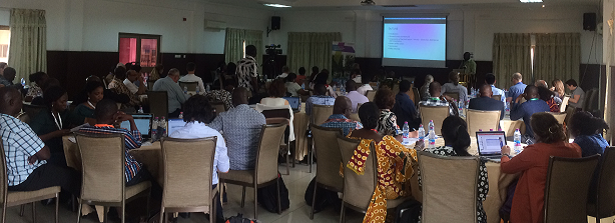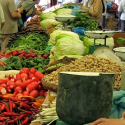Improving Food and Nutrition Security in Ghana from a Food Systems Approach

Reporters: Naa Ayorkor Laryea & Dunyo Kafui, edited by F&BKP Office
On January 17, 2019 the Food & Business Knowledge Platform (F&BKP), WOTRO, the Science for Global Development department of NWO (The Netherlands Organisation for Scientific Research) and the Ministry of Foreign Affairs of the Netherlands organized a research – practice exchange seminar in Accra, Ghana which focused on Food Systems Approaches (FSAs). The meeting was attended by some 30 project members of the NWO-WOTRO Global Challenges Programme (GCP) Call 3 international multi-stakeholder research projects that were in Ghana for their midterm review. They were joined by some 40 Ghanaian Food & Business stakeholders working in the field of agri-business including research professionals, private and public sector representatives, professionals from local and international non-governmental organizations (NGOs), and donors.
The knowledge exchange was organized to improve joint strategies for Food and Nutrition Security in Ghana from a Food Systems Approach for inclusive agri-business. It was mainly driven by research findings from the international multi-stakeholder research groups of GCP Call 3. Additionally, it gave the GCP researchers the opportunity to gain insight in Ghanaian practices in order to sharpen the second half of their research project work on food systems in the coming two years.
Research findings on improving sustainable Food Systems Approaches
“Food system” was defined by the organizers as activities, actors and networks that interact along and around the whole food value chain, which include growing, processing, distribution, consuming and disposing of inputs to waste and recycling. Not only at local, but also at regional and international scale. Furthermore, a food system is influenced by structural conditions such as rules, standards and policies that support operation and optimization of the system.
A summary presentation was given by Professor Laurens Klerkx of Wageningen University & Research in the Netherlands on main project lessons of the GCP-3 projects that are now half way. Professor Laurens treated the diversities of food systems and analysis in the GCP projects. He stated that in food systems, actors and connections are very important as they are influenced by interactive social, political, economic, cultural, technological and natural contexts. He stated that the current food system, also known as industrial food regime, is not desirable, because it has negative environmental challenges, sometimes malnutrition values and also bad prices for farmers. Hence future food systems should be agro-ecological and researchers should focus on how they can help study and understand this agro- ecological alternative food system. He entreated research consortia to consider factors hindering the transition to become more powerful and dominant, to make it possible to move away from the industrial food regime.
In the next part of the programme, Professor Joseph Kofi Teye and Professor Joseph Aweton Yaro of the University of Ghana zoomed in to the Ghanaian food system from a smallholder perspective. In his presentation, Prof. Yaro focused on crops with a motive of examining the food system in Ghana and identifying policy interventions, which can be narrowed down to what the state and non-state actors should be doing and what opportunities should be honored in order to make smallholder farmers more productive, more relevant and more beneficial to their livelihoods. He highlighted the provision of enough quality foods to meet the growing urban population. This is very important because agriculture in Ghana has bounced back to profitability after urban population started growing. He stated that open air markets are equally substantive for the food system in Ghana since it is the path where food circulates. The presentation also captured major factors such as good climate condition, ease of production and marketability, which are needed to determine the type of crops produced by farmers in Ghana. From the above-mentioned factors marketability was considered the most important for the growing group of farmers in Ghana that is moving towards the production of vegetables. The middle classes are consuming more vegetables, but are faced with the problem of perishability. A good marketing system will stimulate selling the produce whilst still in the consumption state.
Practitioners panel on how to improve Ghanaian Food and Nutrition Security
Following, a panel reflected on sustainable inclusive food systems and how policies from profit and non-profit organizations in Ghana are working on it. Three panel members represented farmers, the Ghanaian health sector and agro-business developers: Mr. George Abeiku Whyte, Chief Executive Officer of Farmers Market; Ms. Faustina Vimariba Tour, Greater Accra Regional Nutrition Officer at Ghana Health Service (GHS); and Mr. Eric Zunuo Banye, Knowledge Development professional at SNV Ghana. It was established that most people in Ghana are consuming unhealthy foods due to so many factors. Mr. Eric blamed policy failure for the situation of Ghanaian farmers, who are unable to focus on health of consumers than on their own income. He argued that most policies flooding the agricultural industry in Ghana, are geared towards how to help farmers make enough income but not how to produce more healthy foods. He called this action “farm for cash”. Food consumption in Ghana, according to him, has always been based on quantity and not quality, so most consumers are not mindful of the food they take in. Touching on the above, Ms. Faustina said her sector is working with women in agriculture to educate people on the need to eat healthy by developing recipes for a balanced meals. She said they are working directly with cooks of the school feeding programme which is running nationally to produce foods with balanced diets for children. At the same time they are educating farmers themselves on the need to eat healthy. Mr. Whyte on his part was of the view that most institutions (Ministries of Health, of Trade and Industry, and of Food & Agriculture) who are supposed to work together to ensure the implementation of Food and Nutrition Security policies, are often disconnected, which makes it impossible to tackle this issue from the grass root.
Exchanges between the practical and research community
In a Q&A session, the Ghanaian community interacted with the international and Ghanaian researchers to brainstorm further on solutions for most pressing issues the agricultural sector is facing when it comes to food systems. First, the Ghanaian research community was asked which ICT technologies the government of Ghana should use to communicate with farmers. The answer was that it would be good to stimulate the use of the technology some companies in Ghana are already using when dealing with small groups of farmers across the country. They use short message systems (SMS) to educate farmers on how to access information on weather, the appropriate time to sow their produces and the right time to prepare their lands.
Hereafter the international community was asked how researchers in Ghana can use their findings in such a manner that it is not politicized, as most policies end up not fully implemented because most manifestos do not allow them to be realized. The reaction was that research findings need the support of society to be widely accepted. In Asia the press is well used to achieve this: when research findings are published, most political parties cannot easily dump them, as the whole nation is informed and will ask for the implementation of that research. So, politicians are mostly forced to comply with that. The Global Challenges Programme projects present at the seminar, do not only include researchers but also practitioners from the field of research in their teams, to relate and embed research to realities throughout the whole research trajectory.
The way forward for Ghanaian Food and Nutrition Security
After the exchanges it was concluded that most problems the Ghanaian agriculture sector is facing in terms of Food and Nutrition Security can be blamed on the attitude of farmers and other actors of the food system. It was argued that most institutions accept projects from donors and decide to lead the project alone, simply because they want society to praise only them, without having to share the success with other institutions. Unfortunately, this means most projects are under implemented.
As a result of the conclusions, some future recommendations were formulated:
- To make implementations easier and fast, national and company policies must be localized to the district level.
- To achieve sustainability, successful policies must be documented for future uses.
- To make a huge impact on most of the community, Ministries of Health, Education, and Agriculture are encouraged to work together on projects from donors.
- To ensure sustainability, donors are advised to ensure projects they invest in are private sector-led as most of the government-led projects end after a year or two of existence.
- To create a knowledge exchange platform, where research findings can be shared, revised, handled, implemented and sustained to make them work in practice.
Related articles |
|






